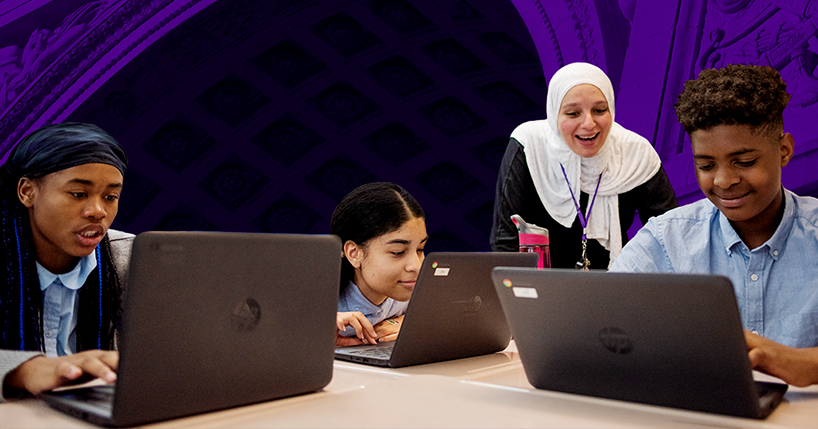In today’s dynamic education landscape, teacher preparation programs must respond to current events, new research, and importantly, students and families in local communities. The NYU Teacher Residency adopted this philosophy when it began in 2016.
Evolving the curriculum based on current events
In the field of education, the term “teachable moment” describes a learning opportunity that presents itself naturally. Excellent teachers find ways to connect with their students through these moments. 2020 presented all of us in education with an overwhelming number of these events – from the country’s reckoning with systemic racial and social injustices to a worldwide health crisis that disproportionately affected communities of color.
NYU Steinhardt faculty constantly search for teachable moments to apply to the broader context of the program each year. During 2020, faculty incorporated new resources that address Black Lives Matter, mental health and self-care, and how to support students through emotionally exhausting situations.
“Early in the spring of 2020 when the pandemic disrupted the landscape of education, Teacher Residency faculty immediately responded by collaboratively addressing the myriad challenges that residents, their students and families, and we as faculty were experiencing and would continue to experience for the duration of the pandemic,” said Tamara Sewell, residency director for New York, NY, special education content mentor for the NYU Teacher Residency, and clinical assistant professor at NYU Steinhardt.
“We adjusted our teaching, observation, and support strategies and modified content and assignment expectations to support residents’ teaching practices in the remote learning environment. Above all, we prioritized social-emotional support for each other, residents, their colleagues, and the students and families they serve. While this response was specific to the pandemic, it is not unique to our practice as NYU Steinhardt faculty. We continually examine our practice, solicit feedback from residents, partners, and colleagues, and make decisions with intentionality and in ways that are purposely iterative and responsive to the learning needs of our residents and the communities they serve.”
For example, teacher residents receive access to various Black Lives Matter resources, including book recommendations and references from Black Lives Matter at School, a national organization that provides a clearinghouse of materials for educators, students, and parents. Residents also collect an ongoing list of support items such as wellness services, guidance for communicating online, and tools to serve emergent bilinguals.
The Black Lives Matter movement speaks to many of the systemic inequities that we challenge within this program. For this reason, it is important that the curriculum evolves to meet this moment in time.
Evolving the curriculum based on feedback and research
While NYU Steinhardt faculty take note of current events and adapt content in real time, they also revise lessons based on annual formal evaluations from students, faculty, and program coordinators.
“Something that’s really important to us as faculty is to make sure that the sequence of our course work supports increased knowledge and skills and that there are clear connections between the different courses in our program,” explained Christine Gentry, residency director for New York, NY and visiting assistant professor at NYU Steinhardt.
“Every faculty member plays an important role in the cohesiveness of the entire program; we always communicate with the instructors of the courses before and after our own. When one module – or course – ends and the next one begins, instructors fill out ‘hand-off memos’ for the next module’s instructors. These memos report out on the climate and culture of the class, logical next steps, things the instructor would change, and any residents who really shined or may need extra support. By doing this, we ensure that each faculty member’s successes and supports can continue throughout the year.”
The hand-off memos are then collected for a full-year evaluation at the end of each cohort. At a formal retreat in May, staff and faculty reflect on the program and recommend curriculum revisions.
For the curriculum to maintain its rigor and relevance, NYU Steinhardt faculty stay abreast of best practices in the classroom, teaching and learning theories, and new resources for student subgroups – especially those that have been underserved in the past, including emergent bilinguals and students with disabilities.
“The one constant for the Teacher Residency is that we support residents to have a flexible learning mindset,” said Nada Ahmed, clinical assistant professor of master of arts in teaching at NYU Steinhardt.
“We are educators preparing and inspiring the passion for teaching and learning for the next generation of educators. We inspire educators to be learners as leaders who question, advocate, innovate, and keep students and families at the center. It is our job to ensure that residents learn about the latest research, teach from the heart, take an anti-racist stance, receive deep coaching and mentoring, and constantly reflect in and on practice.”
The Teacher Residency was born out of the idea that the combination of a rigorous curriculum and an immersive classroom placement is the most effective way to prepare teachers who can successfully reach all students. By definition, the program cannot be static but must constantly evolve.
